Steam Next Fest 2022 Demo Round-Up: Part Two
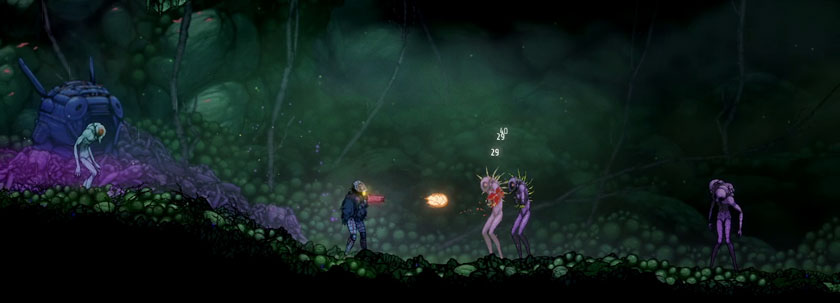
Ghost Song
There are a lot of game comparisons that came to mind when I booted up Ghost Song, each of them undoubtedly a source of inspiration. Metroid, Dark Souls, Hollow Knight; be it mechanically or atmospherically, I could tell each of these titles was informing the design of Ghost Song. However, it is the best kind of influence, for while I was reminded of each of those games, the mechanics and gameplay possess their own unique feel and atmosphere. It feels more unique and individualistic despite that combination of familiar inspirations.
I think much of this comes from the game’s combat, which is more slow and methodical due to both the enemy health pools and the protagonist’s arm cannon overheating. While the player’s rate of fire is at first rapid, it slows down as the cannon grows hot. However, that smoldering red gun barrel becomes a more powerful melee weapon, applying greater damage when striking a close-quarters blow. This developed a sort of careful rhythm to the game’s combat, where you’d focus your rapid fire on one or two enemies before carefully beating another one or two to death with the sizzling hot metal of your gun.
Checking the current feedback for the demo, it seems there are a number of complaints regarding how long it takes to kill foes. I have mixed feelings, as I am certainly not a fan of damage sponges soaking up so much weapons fire. At the same time, without those sponges, there would be no need to vary up your tactics between projectile and close-quarters melee. The demo also barely gives a taste of the modules scattered about the game world, providing the player with additional secondary fire and other boons and bonuses to customize their play style. Perhaps it would be more prudent to modify some enemy health pools while leaving others as they are, working with a scalpel instead of a chainsaw.
My only complaint was getting stuck at one point, though it’s partially my own fault for not experimenting. The dash ability the player unlocks can also be used in mid-air, though I never thought to attempt such a thing. For some reason I had assumed I could only use it while grounded, and thus found myself wandering around for several minutes without a sense of where to go. A single, additional line of information being added to the in-game explanation of the upgrade could fix any potential confusion, however.
Otherwise, Ghost Song is currently one of my favorite games to have played this Next Fest, and I was eager to venture deeper into its depths when I had reached the demo’s end.
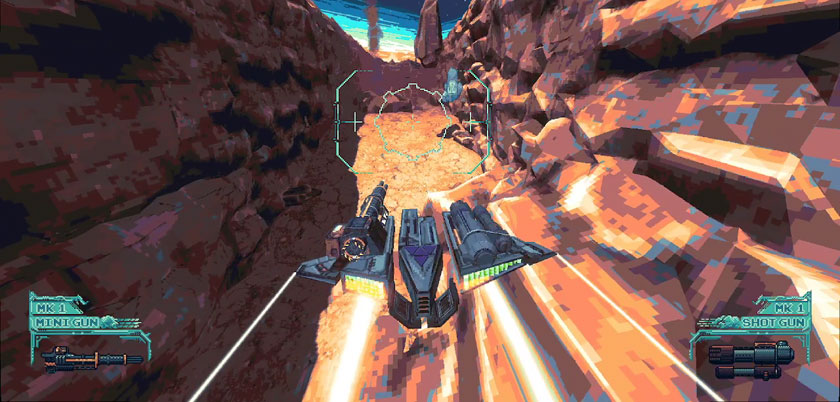
VergeWorld
Last week I listed VergeWorld as one of the titles that caught my eye during Summer Game Fest. Seeing it available for the Steam Next Fest, I excitedly booted up its demo to see what a classic-yet-modernized style of Star Fox gameplay might feel like.
It doesn’t feel very modernized at all, it turns out.
Yet another translation needing some editing and polish aside, VergeWorld is certainly trying to play with ideas from two separate Nintendo games – at least, that’s the impression I get. The player can gain a major speed boost by flying low to the ground, creating a sort of F-Zero vibe of intense speed in a futuristic vessel. Everything else is certainly in the style of Star Fox, but the ship feels sluggish compared to the speed it moves at. Even if you’re holding down on the brake for half the map, the high-speed fighter’s response is so delayed that collisions with rocks and obstacles feel inevitable. Attempts to take down opponents while flying through the canyon trenches is less exciting and more of a chore as the targeting reticle feels detached from the movement of the ship. The player’s attention ends up being split between bogeys and obstacles.
The promise of VergeWorld is interesting, but I think the first issue it needs to address are the game’s controls. They don’t feel responsive and as a result you’re just fighting against your ship instead of the enemies speeding ahead of you. The second issue is that the game’s design seems torn between being an arcade rail-shooter and racing game. The end result is that it is neither, and what it is just isn’t responsive, intuitive, or enjoyable. It’s frustrating instead.
Perhaps this is my fault for projecting influence that may not even be there. I saw the gameplay and Star Fox leapt to mind. I still have a feeling that’s what the developers were going for, but as of now, they are sorely missing the mark if that is their goal.
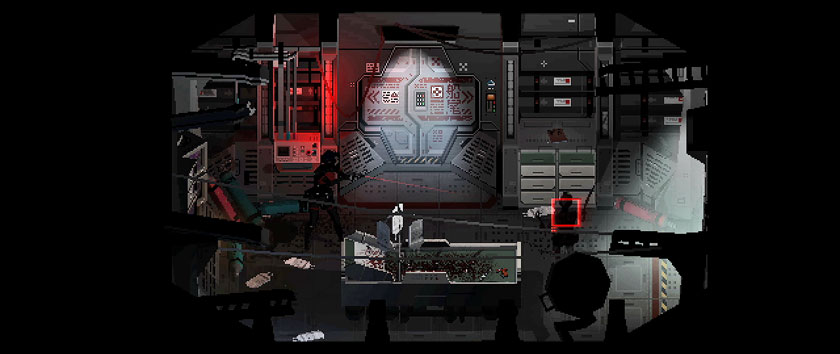
Signalis
Another title I had been looking forward to from Summer Game Fest, Signalis was the exact opposite of my experience with VergeWorld. The trailer gave off vibes of Resident Evil without being a direct imitation, and sitting down to play the demo, I found my initial impression to be on the mark. This is the sort of game you play with the shades drawn, lights out, room lit only by the glow of your monitor or television as you creep through its silent, unsettling halls.
It’s not a very long demo and only gives a taste of what to expect, but that is what has me so eager for the final release. By the time the demo ended I was almost upset. That was it? Half an hour and I was finished? I wanted more! Yet that desire for more is precisely what had me smiling. This was going to be a good game.
The inspiration no doubt extends beyond Resident Evil, giving off psychological and puzzle vibes of Silent Hill as well. Nonetheless, it manages to be its own thing. Yes, you have limited inventory space as in Resident Evil, an identical health monitor to inform you of how much damage you’ve taken, and even a storage bin to deposit items into that are no longer necessary or should be saved for later. There are documents hinting towards the preceding disaster and offering insight into the game’s mysteries, journals characterizing the deceased before everything went belly up, and clues scribbled on photographs and slips of paper. There were puzzles to solve and keys to obtain in order to leave the small vessel serving as the game’s tutorial zone, and a need to resort to desperate melee strikes in order to save on ammunition.
While it mechanically sounds identical to its zombie-infested-mansion influence, I cannot help but think Signalis has something unique going for it. Perhaps it’s the top-down perspective that separates the game from its inspirations, or the science-fiction aesthetic with some anime character art thrown in. Maybe it’s the story itself, delivered with subtlety instead of B-movie camp. Ultimately, however, I think it’s about the vibe, and the vibe of Signalis is nostalgic while retaining its individualism.
Regardless, fans of the old-school survival horror games from the PlayStation owe it to themselves to wishlist this title. It’s definitely one to watch out for.
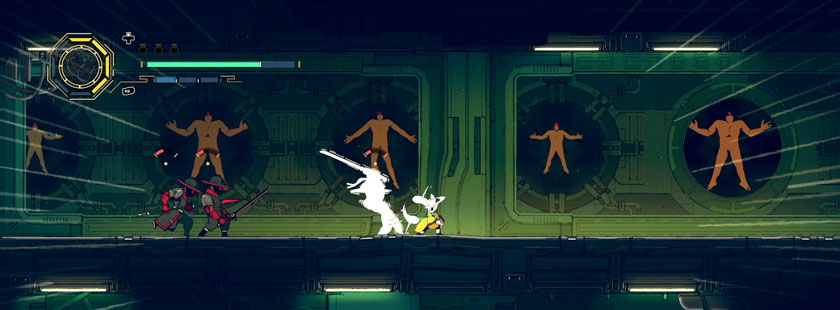
Nine Sols
I almost forgot that I had already wishlisted the next title by Red Candle Games, creators of the “controversial” (in certain territories) Detention and Devotion. Nine Sols is a departure, more of an action-oriented and parry-heavy Metroidvania Souls-like, a pairing of genres that is becoming more and more vague and ridiculous the more of these games I play. As you’ll see towards the end of this series, “Metroidvania Souls-like” is a description of many games, but they are all different in their own right.
With Nine Sols, the emphasis is less on both of those genre-definitions and more on narrative and action. This game is heavily invested in its story and is surprisingly effective at getting the player interested in the fate of what is, ultimately, a barely-character placed into a dire circumstance. The actions of the protagonist at the moment launch the player into the demo proper, shoving the player into action. If you want to survive in Nine Sols, you need to get good with the parry mechanic, and to get good with the parry mechanic you need to learn enemy behaviors and judge when it is best to try and block and best to use the dodge ability (protip: when you’re about to get mobbed).
In hindsight, I’m not even certain “Souls-like” is an accurate description, as I cannot recall if you are capable of picking up the currency you lose upon death. Scanning the footage recorded, I know you can lose it, but it’s also separate from the more traditional level-up mechanic of experience gained through combat. If there’s anything “Souls-like”, it is in the emphasis on respawn points, health regeneration based on a finite resource you can refill when resting, and a high difficulty. Save for that second one, these are all common game mechanics or traits that predate and are not unique to the Souls-like genre.
Regardless, the game feels incredibly polished, smooth, and possesses responsive controls. I even tackled the bonus beast that you get for completing the demo, though I gave up when I realized there were multiple tough phases to the fight. The question looms whether this game will actually be too difficult for me; it is a fast-paced, highly skill-based title that I found myself greatly enjoying, but I also struggled here and there with proper parry timing and swift response. So I would not recommend trying it if you’re a fan of Metroidvanias or Souls-likes. Instead, I’d recommend it if swift, intense battles that require quick reflexes and fast thinking are what you crave.
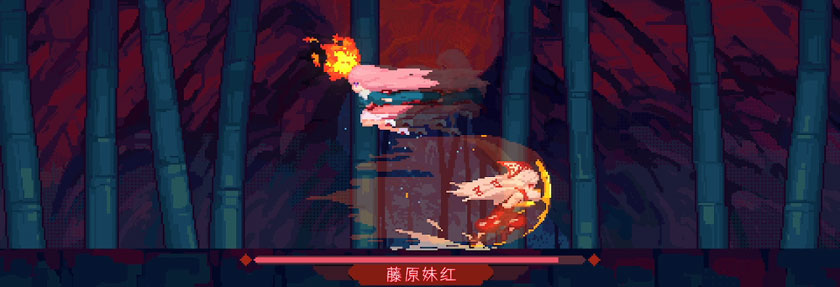
Touhou Blossom Soul
Though I’m not familiar with the greater Touhou universe – a massive multi-media project developed by a single man in 1995 and still on-going – I did enjoy Touhou Luna Nights, a fangame made by Deedlit in Wonder Labyrinth developer Team Ladybug. While I’m not big into the Bullet-Hell Shooter genre that makes up the majority of Touhou Project titles, Blossom Soul looked to fit the same sort of side-scrolling action that Luna Nights had hooked me with. So, I downloaded the demo and decided to give it a spin.
From what I could gather, the demo had no English language option. Nonetheless, I was able to feel my way about its menus and get started with… a straight up boss fight with very limited combat capabilities and a very, very repetitive boss A.I.
I wish I could offer a more informed opinion on the demo, but all I did was jump, dodge a fireball, and then try to get a hit or two in on the boss before she dashed across the screen again. A very primitive strategy came to mind of just sticking to one side of the stage, waiting for her to cast the fireball, dash, and then for me to jump, dodge, and try to hurry and pierce her with my spear. The window to deal damage was tight and I took enough hits myself to die anyway. It wasn’t worth it.
I’m curious if the Touhou Project can branch out into more genres than Bullet-Hell and Fighting as it had with Touhou Luna Nights, but it seems like not all fan games will have the polish and ambition of Team Ladybug. This one is a pass for now.


